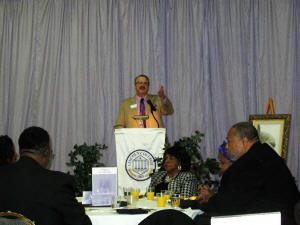|

Reverend Glenn Shelton, a member of the planning committee for
the event, gave the invocation thanking God for his grace and mercy,
blessing the food, and praying “all would be blessed by what [they]
see and hear.”
As he welcomed everyone to the breakfast, Shelton said the occasion
was an “opportunity to express joy and happiness because we have
another day.” He said, “You’re as welcome as the sunshine is to the
earth after a gloomy, cold night.” Shelton thanked the committee who
worked so hard to put the event together.


Tom McLaughlin, Lincoln Heritage Museum Director and Master of
Ceremonies introduced Lincoln College President, Dr. David Gerlach,
who provided the keynote address. McLaughlin said since Gerlach has
come to Lincoln College, several new four-year programs have been
added and student involvement and enrollment has increased. Gerlach
has also improved the college’s relationship with the surrounding
community.

Dr. Gerlach said he was honored to speak. Gerlach said, “the title
of my remarks is ‘The intersection of Dr. Martin Luther King and
Mahalia Jackson at Lincoln College, honoring their legacies.”
Gerlach said Martin Luther King was only 39 when he was
assassinated.
Gerlach said President Lincoln freed 3 million southern black slaves
through the Emancipation Proclamation on January 1, 1863 and later
helped pass the thirteenth amendment, which abolished slavery. He
said thousands died in the Civil War, which was fought over “flames
of withering injustice.” Gerlach said it was only the beginning of
the change in this country of the way blacks were treated and
perceived.
 Gerlach said it took another 100 years for African Americans to gain
the “full measure of civil rights” with the Civil Rights Act of 1964
and the voting rights act of 1965. He said these two historic
initiatives were just the midpoint of what Dr. King spoke of in his
“I Have a Dream” speech. In the speech, King said, “I have a dream
that one day this nation will rise up and live out the true meaning
of its creed: ‘We hold these truths to be self-evident, that all men
are created equal.’"
Gerlach said to understand the impact of King’s work, we must “gain
an understanding of the attitudes” of many in this country during
those years. King grew up in the shadow of Jim Crow laws, separate
but equal, segregation, for whites only, sundown laws, and the KKK.
After the civil war, civil rights had advanced very little beyond
freedom.
Gerlach said on one trip during high school, King had to stand on a
bus so whites could sit. King initially refused, but his teacher
reminded him the seats were for whites only. King said it was “the
angriest I had ever been in my life.”
Gerlach said King chose to enter ministry because of his “inner urge
to serve humanity” and would go on to earn several degrees.
Gerlach said one of King’s first forays into civil rights occurred
in 1955 after Rosa Parks refused to go to the back of the bus. King
organized a bus boycott that lasted over a year. King was arrested,
but bussing in Montgomery, Alabama soon became desegregated.
Gerlach said King was threatened, jailed, beaten, stabbed, and hit
with bricks, but led his fight for civil rights through non-violent
civil disobedience. King once said, “We know through painful
experience that freedom is never voluntarily given by the oppressor;
it must be demanded by the oppressed.”
Gerlach said King’s 1963 “I have a Dream” speech was one of the most
powerful speeches ever. King referenced the Emancipation
Proclamation in the speech as he said, “But one hundred years later,
the Negro still is not free” and “still sadly crippled by manacles
of segregation and the chains of discrimination.” King said, “One
hundred years later, the Negro lives on a lonely island of poverty
in the midst of a vast ocean of material prosperity . . . still
languishes in the corners of American society and finds himself an
exile in his own land.” King said he wanted to “dramatize a shameful
condition.”
Gerlach said in King’s last few years, King fought against
segregation, voter disenfranchisement, discriminatory housing
practices, poverty, and lack of opportunity. King spoke against the
Vietnam War and said, “a nation that continues year after year to
spend more money on military defense than on programs of social
uplift is approaching spiritual doom.”
[to top of second column] |

Gerlach said King’s speech on February 4, 1968, exactly two months
before his assassination, referenced the gospel of Matthew. King
said he wanted to be remembered for feeding the hungry, visiting
those in prison, clothing the naked, and loving and serving
humanity. King wanted to leave a committed life behind.
Gerlach said in King’s final speech, “I’ve been to the mountaintop,”
King spoke of difficult days ahead and said, “I just want to do
God’s will.” King said God “has allowed me to go up to the mountain,
and I have looked over and I’ve seen the promised land.” King said,
“I may not get there,” but “we as a people will get to the promised
land.”
Gerlach said King’s last words ever, were spoken to a musician as
he said, make sure you play “Take My Hand, Precious Lord” in the
meeting tonight. The song was King’s favorite and he often invited
Mahalia Jackson to sing it at civil right’s rallies to inspire the
crowds. King was shot April 4, 1968 on a motel balcony and this song
was sung at his funeral.
Gerlach said on September 29, 1963, the Lincoln community was
treated to a concert by Mahalia Jackson to help raise funds for
Lincoln College’s Hart Science Building. Gerlach said the concert
was a great pride and honor for the college and for Jackson, who
received an honorary doctorate from the school.
Gerlach said just one month prior, Jackson had sung in front of a
quarter of a million people before King gave his “I Have a Dream”
speech. Gerlach said Jackson contributed funds from the concert to
Lincoln College’s Hart Science building fund, even after Jim Crow
laws in Lincoln did not allow her to stay in any of Lincoln’s
hotels. She was forced to stay at a hotel in Springfield that
welcomed black patrons.
Gerlach closed by saying in celebrating Martin Luther King Jr’s.
Birthday, let me quote King one more time “Life’s most persistent
and urgent question is ‘What are you doing for others?’"


The 2016/2017 Martin Luther King Minority Scholarship went to
recipient Ty Whitetree. Whitetree is a 2016 graduate of Lincoln
Community High School and has been an active participant in Student
Government during his freshman year at Lincoln College. He plans to
major in Sports Management. Whitetree also coaches a Special
Olympics basketball team.
Whitetree thanked Lincoln College, his parents, and Glenn Shelton.
Whitetree said he was excited to write an essay about his Native
American heritage, which is he proud of, and then to find out he had
won the scholarship. He said he likes college better than high
school and Lincoln College has shown him a lot of hard work goes
into being a successful student. Whitetree is excited about the
semester.
Before a collection was taken up for the Scholarship fund, Reverend
Shelton spoke of serving through giving and reminded everyone of the
contributions of Joyce Kinzie. Shelton said, “Give the best that you
can.”
While the collection was taken, the Lincoln College Chorale and
Second Baptist Youth Choir asked everyone to join in as they sang
"We Shall Overcome.”


During the morning’s program, the LC Chorale also sang “Up to the
Mountain” and the Second Baptist Youth Choir sang “Bless the Lord,
Oh my Soul.”
 Reverend Shelton closed the morning's events with a benediction
thanking God for blessing the breakfast honoring Joyce Kinzie and
Martin Luther King and for Dr. Gerlach reminding us of Mahalia
Jackson. Shelton prayed for God’s support as we continue to serve.
The scholarship committee consisted of Reverend Glenn Shelton, Les
Plotner, Debbie Ackerman, Tom McLaughlin, and Jen McMillin.
[Angela Reiners] |